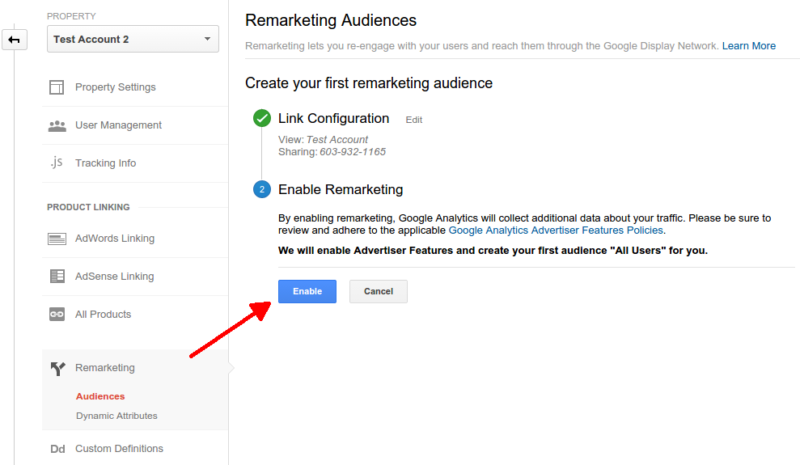Harnessing Remarketing in Google Analytics: A Comprehensive Overview
Harnessing remarketing in Google Analytics offers companies a strategic edge in connecting to possible consumers. The capability to target people who have currently connected with your website offers a distinct opportunity for tailored marketing efforts. By recognizing just how to craft target market checklists and release them successfully, organizations can substantially boost their conversion prices. Nonetheless, the ins and outs of establishing and enhancing remarketing projects call for a comprehensive understanding of audience division and efficiency analysis. This overview will certainly clarify the important steps associated with harnessing the complete capacity of remarketing in Google Analytics, causing enhanced advertising and marketing end results.
Understanding Remarketing in Google Analytics
Remarketing in Google Analytics enables services to strategically target customers who have previously connected with their web site or mobile application. By leveraging information from Google Analytics, companies can produce customized remarketing lists based upon user actions, such as pages checked out, actions taken, or specific goals attained. This powerful device allows businesses to re-engage with customers that have revealed passion in their solutions or items, ultimately raising the possibility of conversion.
Comprehending the different kinds of remarketing methods is vital for a successful campaign - What Is “Remarketing” In Google Analytics?. Google Analytics supplies numerous options, including typical remarketing, vibrant remarketing, and remarketing lists for search advertisements (RLSA) Each type serves a special objective and can be tailored to satisfy particular advertising purposes
Additionally, examining the performance of remarketing projects is necessary for enhancing outcomes. Google Analytics provides beneficial understandings right into the performance of various remarketing strategies, enabling companies to make data-driven choices and improve their targeting approach. By continuously adjusting and keeping an eye on remarketing efforts based on analytics information, companies can optimize ROI and drive success in their advertising initiatives.
Establishing Up Remarketing Projects

After setting up audience lists, the following action is to connect Google Analytics with Google Ads. By connecting these two platforms, companies can seamlessly transfer audience listings from Google Analytics to Google Advertisements for remarketing purposes. This assimilation permits for even more precise targeting and far better campaign performance.
As soon as the accounts are linked, businesses can develop remarketing campaigns in Google Ads making use of the audience lists formerly defined in Google Analytics. These campaigns can be tailored with particular ad best site creatives, messaging, and bidding process methods to successfully re-engage with previous site visitors and drive conversions. By following these steps, companies can utilize the power of remarketing to enhance their marketing efforts and increase ROI.
Using Target Market Division Techniques

Predefined sectors in Google Analytics permit you to rapidly analyze common audience classifications like new individuals, returning users, or users who finished a details objective on your web site. Personalized sectors, on the various other hand, enable you to produce unique sectors based on certain requirements that are necessary to your organization goals. Dynamic remarketing listings automatically readjust based upon customer actions, showing individualized ads to users that have interacted with your site particularly ways.
Analyzing Remarketing Performance Metrics
Upon evaluating the performance of remarketing campaigns in Google Analytics, the analysis of read what he said key performance metrics gives useful understandings into audience interaction and conversion rates. By delving right into metrics such as click-through rates (CTR), conversion prices, price per procurement (CPA), and return on ad spend (ROAS), marketers can determine the success of their remarketing initiatives. CTR shows the portion of customers that clicked on the advertisement after seeing it, showing the ad's importance and appeal. Conversion rates gauge the percentage of customers who completed a wanted activity, such as buying, after clicking on the advertisement. CPA discloses the ordinary expense sustained for every conversion, aiding analyze project profitability. ROAS, on the various other hand, evaluates the revenue generated for each buck invested on marketing. Assessing these metrics enables marketers to optimize projects, refine target market targeting, and allocate budgets properly to enhance overall remarketing performance.
Maximizing Remarketing Approaches
When refining remarketing techniques in Google Analytics, concentrating on audience segmentation is critical for achieving campaign success. By splitting your target market into particular segments based upon their behavior, demographics, or rate of interests, you can customize your advertisements more efficiently to each team. This targeted approach increases the likelihood of involving users who have currently shown passion in your service or products, bring about higher conversion rates.
Another vital aspect of enhancing remarketing approaches is continuously screening and refining your projects (What Is “Remarketing” In Google Analytics?). A/B testing Full Report various advertisement creatives, messaging, or offers can help you identify what reverberates finest with your target market and drives the most conversions. By analyzing the performance of these tests in Google Analytics, you can make data-driven choices to optimize your remarketing initiatives even more
Moreover, leveraging vibrant remarketing can substantially improve your project results. This function permits you to reveal personalized ads to customers based on their previous communications with your site, showcasing services or products they have actually formerly watched. By delivering tailored content to individuals based on their actions and interests, dynamic remarketing can help raise engagement and drive conversions.
Conclusion
Finally, taking advantage of remarketing in Google Analytics is a tactical technique to target users that have actually formerly engaged with a web site. By developing customized target market checklists and using audience segmentation approaches, organizations can optimize remarketing projects for increased conversion rates. Analyzing performance metrics and constantly maximizing strategies are critical for maximizing the performance of remarketing efforts.
Google Analytics offers numerous alternatives, consisting of conventional remarketing, dynamic remarketing, and remarketing checklists for search ads (RLSA)After setting up audience lists, the following step is to link Google Analytics with Google Ads. By connecting these two systems, organizations can effortlessly transfer target market lists from Google Analytics to Google Advertisements for remarketing objectives.When the accounts are linked, services can develop remarketing campaigns in Google Advertisements making use of the audience notes formerly specified in Google Analytics.When refining remarketing strategies in Google Analytics, focusing on audience division is critical for attaining project success.
Comments on “A Full Overview to Remarketing In Google Analytics”